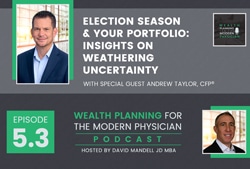Insights on Weathering Uncertainty
In this special episode tied timed to release before the upcoming U.S. elections, host David Mandell welcomes OJM Partner and Wealth Advisor Andrew Taylor, CFP, to discuss investing through impactful current events, including potentially stress-inducing election seasons.

(Video Available October 17, 2024)
In this unique episode, David and Andy refer to a number of slides based on data from U.S. presidential elections going back more than 60 years. For those watching on our YouTube channel, those slides are part of the video content. For those listening, a link to the powerpoint slides can be found here. Also, the article that Andy references regarding October volatility can be found here.
TAKEAWAYS:
Takeaway 1: Investing should not be influenced by fear or current events
David Mandell and Andrew discuss the impact of current events on investing, stressing that while events such as presidential elections can cause uncertainty and volatility in the market, they should not dictate investment strategies. “Investing is challenging because there’s always a reason to be fearful,” Andy says, noting that the market has shown resilience through numerous significant events. Mandell adds that it’s crucial for investors to have a diversified portfolio that aligns with their long-term goals, rather than being swayed by the news or current events.
Takeaway 2: The power of staying invested regardless of political climate
The speakers address the common concern of how presidential elections might impact the stock market. Taylor shares historical data showing that the market has performed well under both Republican and Democratic administrations. The key takeaway, however, is not which party outperformed the other but the importance of staying invested for the long term. “The overriding theme is you can make money regardless of who’s in office,” Taylor stated. He also highlights the fact that a divided Congress tends to be optimal for market performance, as the gridlock often leads to market stability.
Takeaway 3: Volatility is to be expected, especially during election season
The discussion further delves into market volatility, particularly during election season. Taylor points out that October has historically been the most volatile month for markets, largely due to speculation about potential policy changes and their impact on the market. However, he emphasizes that investors should not let short-term volatility impact their long-term investment strategy. “There’s a lot of uncertainty upcoming, and we can certainly anticipate an increase in volatility…However, we certainly don’t want that to impact your long-term investment strategy,” Taylor advises.
INSIGHTS
- Historical Events and Market Resilience: The discussion emphasizes how markets have historically withstood numerous geopolitical and financial crises, from Vietnam and the Iran hostage crisis to 9/11 and the COVID-19 pandemic.
- Key Point on Fear: Andy highlights the constant fear-driven market environment, noting that investors are often anxious due to media-fueled concerns about financial and geopolitical events.
- Long-Term Market Performance: The S&P 500 has shown consistent long-term growth despite short-term volatility during events like COVID and the 2008 financial crisis, underscoring the importance of staying invested.
- Election Concerns: The podcast delves into how elections, while significant, are just one of many impactful events that investors navigate, suggesting that the right long-term strategies are crucial.
- Market Responses to Presidents: The analysis shows that markets can perform well under both Republican and Democratic administrations, and attempting to time investments based on political changes can lead to reduced compounding returns.
- Effect of Divided Congress: Historical data suggests that markets perform best under a divided Congress, which creates legislative gridlock, reducing uncertainty and allowing businesses to thrive without drastic policy changes.
- Media Influence on Investment Fear: Financial media tends to amplify fear, which can misalign with sound investment principles. Investors should be cautious of reactionary decisions based on headlines.
- Goal-Based Investing: The importance of aligning investment strategies with personal goals and risk tolerance, especially during volatile periods like elections, is emphasized as a key approach for long-term success.
- Impact of Presidential Policies: Despite fears surrounding policies like tax increases or tariffs under presidents such as Obama and Trump, the market showed resilience and growth during both their terms.
- Volatility in October: Historically, October tends to be the most volatile month for the market, with increased speculation due to upcoming elections. However, this volatility often doesn’t translate to negative returns.
- Compounding Returns: The power of compounding is stressed, particularly when staying invested during various political regimes, as attempting to time the market can drastically reduce long-term gains.
- Prudent Portfolio Allocation: The podcast advises that a balanced portfolio, especially one with bond allocations, can help investors weather downturns, as bonds tend to perform well when equities suffer.
- Investment Strategy for Retirees: For those nearing retirement, a more conservative approach to investments is crucial to avoid significant losses during market downturns, while younger investors can afford to take on more risk.

